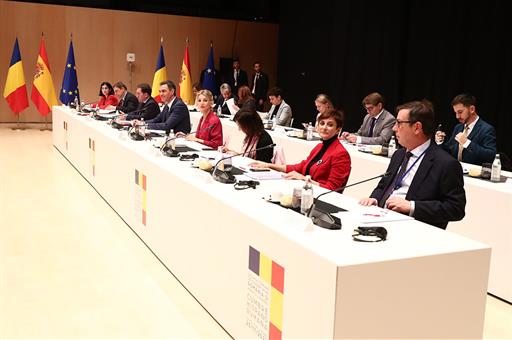1st Spanish-Romanian Summit
Isabel Rodríguez and her Romanian counterpart pledge to coordinate their position on depopulation in the EU
News - 2022.11.23
"Minister Cseke and I have undertaken to study collaboration mechanisms for tackling the EU debate on depopulation in the EU, particularly in southern Europe, in a coordinated manner", explained Isabel Rodríguez.
The Minister also highlighted cohesion policy as a fundamental tool for understanding the integration of the different territories of the Union: "Our country upholds this policy as one of the greatest achievements in EU history and, together with the regional governments and bodies like the Committee of the Regions, we are committed to placing it high on the agenda for our Presidency in the second half of 2023".
"Today's meeting has allowed us to learn about the national strategies we are implementing and to identify ways to coordinate at EU level. We share the commitment to overcome the digital divide in rural areas, as a tool to promote cohesion and equal opportunities. We also have exchanged best practices", she added.
In this regard, the Minister took stock of some of the steps taken by Spain: "We have set up a fibre optic network covering almost the entire territory. We will now complete this exercise as part of the Single Rural Demand Plan, which seeks to bring connectivity to ultra-rural areas, using alternatives like satellite connection or terrestrial wireless technology.
"We develop programmes for modernising and digitalising local entities and local bodies, with special emphasis on small towns. At the same time, we are investing in programmes such as "La Administración Cerca de Ti" (The Administration Close to You), with which we want to reach over 3,200 towns to facilitate procedures, such as for issuing of electronic certificates", continued Rodríguez.
In addition to digitalisation, the other major challenge shared by Spain and Romania in rural areas is the ecological transition: "We have just expanded the programme dedicated to local clean energy projects in towns with less than 5,000 inhabitants, which allows us, for example, to invest in energy efficiency projects in public buildings and infrastructures, in the promotion of green investments and, in particular, self-consumption", she stressed.
Coordination of administrations to implement European funds
Isabel Rodríguez also shared best practices with Minister Cseke for coordinating public administrations to implement the New Generation Funds in the European Union: "The transformation of Spain in recent decades would not have been possible without co-governance, i.e. the successful collaboration of administrations at local, regional and national level that is enshrined in our autonomous model", she emphasised.
The Minister pointed out that the decentralisation process has contributed both to providing solutions for the aspirations of the regional governments and to deploying the Welfare State: "In the first decades of Spain's accession to the EU, local bodies and regional governments were decisive in implementing European funds. In the aftermath of the pandemic, they have also played a key role in designing the recovery, transformation and resilience plan."
At present, the Government of Spain has already transferred €19 billion from the Recovery, Transformation and Resilience Plan to the regional governments for its implementation, agreeing with them both the amounts and the distribution criteria, through the multilateral sectoral conferences.
Spain, the host country
Isabel Rodríguez, on the other hand, highlighted the Government of Spain's support for welcoming and integrating the policies of local bodies in Spain: "We are complementing the initiatives of many local entities, provincial administrations and regional governments determined to strengthen ties with the Romanian community, and Castellón is an excellent example".
And she highlighted the Decree approved by the Government of Spain last May, which is making €102 million available to local bodies and regional authorities to finance innovative pilot projects for inclusion, within the framework of the Recovery Plan: "We aim to improve people's lives in specific areas, such as energy supply, digital skills, education, health and access to the Minimum Basic Income".
Non official translation





